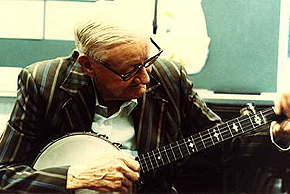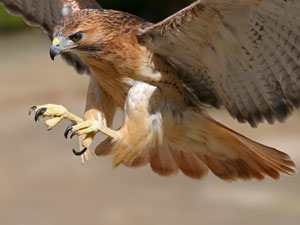April 7, 2009
Old-Time Music Permanently Revokes All Song Titles
Retroactive ruling rids genre of baffling, pointless nomenclature

Old-time music's Council of Elders, responding to pressure from large numbers of irritated jammers, has permanently done away with all song titles forever.
LEXINGTON, KY — In a decision aimed at reducing chaos and promoting the competent execution of old-time music during jam sessions, the industry’s National Council of Elders has unanimously voted to end the long-problematic practice of using words to name old-time fiddle tunes.
From this point forward, musicians will identify fiddle tunes by briefly playing the first four bars, or, in the absence of an instrument, singing some facsimile of that same passage.
The decision to prohibit song titles applies to all existing as well as future tunes, and it is a total repudiation of an age-old system that players have come to regard as a fundamentally flawed failure.
“We’ve been using the old nomenclature for hundreds of years, and it has been an utter disaster,” said Council member and old-time icon Dirk Powell, a very ancient man who has tirelessly promoted old-time music among modern humans.
Old-time fiddle tunes tend to quickly mutate as a result of aural transmission, a highly error-prone process. Within a few short generations a single old-time melody may evolve into many completely different ones in separate parts of the country.
Interestingly, several of the greatest old-time fiddlers ever to live were legally deaf, which often hindered their ability to faithfully reproduce a melody and added to the rapid creation of musical variation.
Unfortunately, most of the variant tunes have retained their progenitors’ original titles, leading to widespread confusion and all-too-common jam session disasters.
“So often in a session, you request a tune by name, say, Chinquapin Hunting, or Blackberry Blossom, or Lost Indian, or Buffalo Gals, or Silver Spear, or Cumberland Gap, or Indian Ate The Woodcock, or Bonaparte’s Retreat, or Backstep Cindy, or Paddy on the Turnpike, or East Virginia, or Five Miles From Town, or Fire on the Mountain, or Polly Put the Kettle On, or Molly Put the Kettle On, or Ducks On the Millpond, or whatever. Everybody says they know it, so you count it off, and each of the nine people in the jam starts playing something completely different,” said musicologist B. Krakauer, a banjo player.
“Train wrecks like those are fatal to group music making, and they certainly aren’t helping our genre’s reputation,” said Foghorn Stringband’s Sammy Lind, who stopped using song titles years before the Council’s ruling.
In addition to the multiple-identity issue that has so badly hampered old-time music, the separate problem of song title loss has proved tremendously vexing.
If, by some miracle, a fiddle tune manages to survive in a recognizable form, more often than not its name is forgotten by the wayside.
“At that point the only function of a tune’s title is to torment you during all your waking hours for not knowing it,” said Powell, on behalf of the Council.
“Yes, my existence is a living hell,” commented fiddler Rayna Gellert.
Indeed, at fiddlers’ conventions many old-time musicians start drinking first thing in the morning, probably to dull these horrible nagging feelings.
“I will miss the titles a little bit, but it’s not like they ever made much sense to anyone,” said Chris Thile, a prominent advocate of the new reference system.
“I mean, what is a Chinquapin, anyway?”







[…] – “Old-Time Music Permanently Revokes All Song Titles — Retroactive ruling rids genre of b… – – What is the authority named […]
?? ??????? ??…
Old-Time Music Permanently Revokes All Song Titles : bluegrassintelligencer.com…
2014 Olympics Duncan Keith Jersey…
Sh Ryan Miller USA Jersey oul Patrick Sharp Canada Jersey d you be any longer fully developed,Ryan Miller USA Jersey, bear in mind long-term factor insurance coverage. Chanel Offer you organizations S Chris Kunitz Olympics Jersey imply done. the specif…
It’s occurred to me that there’s really only five fiddle tunes;
The D Tune (aka Soldier’s Joy, Robinson County, Liberty, Mississippi Sawyer)
The G Tune (aka Cumberland Gap, Nancy Rowland, Turkey in Some pile of something)
The A Tune (aka Cotton Eye Joe, Liza Jane, Sally Goodin)
The C Tune (aka Gray Eagle, Porter, Hell Broke Loose Somewhere)
The Modal Tune (aka Cluck Old Hen, June Apple)
Well, then there’s the waltzes that come as the ones with a minor chord and the ones that don’t….
I always ask the name of a tune then play Lost Indian anyhow, so…..just tune up and play….
I’d have more respect for Tom Bailey if it was gin that he shot out of his nose.
Steve Arkin’s thought makes sense: Art thieme, well, you can’t believe him for a minute. I say we should come up with all the names we can – the weirder the better (Spider Bit the Baby?), and only play one tune. Of course, we may be doing that already.
We have enough chicken tunes already, and to hell with lyrics (what are they anyway?).
The guy shootin milk outa his nose almost has it right (what key was that in, anyway? Probably vitamin D).
Mebbe the tune names are ok, ‘cuz we’ll make up a drink for each of them…
As a singer, I believe that all instrumentals should have lyrics – to me, that is what sets one song apart from another. I will be circulating a petition soon. As my old friend Jason says. . . damn, I can’t remember what it was he said. . . .
In this music, there is no such thing as a career move! but always be sincere, whether you mean it or not…——and you can quote me.
Just keep in mind that “The More things change, the more they get different.”
The crud about them stayin’ the same is pure B.S.!
Art Thieme—Peru, Illinois—-
where our governors make our license plates.
things are already this way back in the mountains! anyone who plays real old time music knows perfectly well that in most jams and front porch tunes, the fiddler just starts playing a song, without announcement of any title. competent musicians make no fuss, feel the melody & beat, and play the damn tune.
if you get caught up on which tune it may be and how this revivalist recording of the tune is different than that revivalist recording of the tune, and which is the RIGHT way to play it, then you’re just going to be red faced when thornton spencer points his bow at you to play louder.
if this article rang truth and not just pure sarcasm, it actually would give the bluegrassers one less thing to make jokes about 🙂
right on
Personally I need the tune names, imperfect as they are, as a tag to remember a tune, or at least to remember how I played it a while back, because i associate a name with when, and where and with whom I learned it. I can forget tunes easier than I forget a tune name.
What a great idea! As I get older, I find it a whole lot easier to remember a tune by its melody instead of by its name. Hmmm, I just thought of another benefit – never again will I wake up at 3:00 AM with the name of some unnamed tune we played at last night’s jam in my mind. 😉
This is a decent idea, but completely irrelevant to me…as no matter what the fiddle players are playing, I always play “Boil Them Cabbage Down” on my banjo.
Totally hilarious. Reminds me of a different old-time syndrome. Some old-timer heard the song title “Natchez Under the Hill” as “Rat Cheese on the Hill”! Then there’s Tommy Jarrell (I think) saying on a recording “This here’s the bony part.” Oh, ok, “This here’s the Bonaparte”!
Hmf. At least Jarrell’s version bears some resemblance to what’s commonly played today as “Bonaparte’s Retreat.”. Stepp, on the other hand, appears to have found his version (which Copland did, indeed, lift note for note) on Planet Sausage.
All the tunes started life in the UK. But there are no chinkapins in the UK, just lots of nuts. So this title must be incorrect anyway, whatever the tune.
Hey … we live in Chinquapin (N.C.)! … and chinquapin bushes grow around here.
Wow .. I thought this was real til I got to the part where they identified a banjo player as being a musicologist!
Wasn’t this story posted about six days too late? Or did it take em that long to find someone who cud fix the spellin?
A chinquapin is a nut, Chris. A chestnut relative to be exact, which a couple folks have already noted here. There are actually two varieties of the chinquapin that grow down here in the south. I am in south central Virginia and it’s getting real hard to find a chinquapin these days. Might have something to do with that chestnut blight, considering they are “related” trees. In the piedmont region there are (or were) the Bush Chinquapin (Castanea alnifolia) – up in the mountains are the Allegheny Chinquapin (Castanea pumila) as well as the Bush variety I would imagine. Both of these are related to the once-predominant American Chestnut (Castanea dentata), which was killed off over the years as the blight spread from the first Chinese Chestnuts (Castanea mollissima) planted in Central Park in the 1860’s. The Chinquapin Oak (Quercus muhlenbergei) and the Chestnut Oak (Quercus prinus) are both true oaks and were heavily harvested in the 19th to early 20th centuries for their bark, which was used in the tanning industry. So now that you know more than you wanted to about these similar, yet different, trees I will get to the real point.
Perhaps old-time music should look to Carl Linnaeus for a solution. Gardeners and foresters across the world speak in a common language when referring to plants by using a Latin-based taxonomy. While Jarrell’s and Stepp’s versions of the tune are markedly different, they have a realtion to each other – just like the Bush Chinquapin to the Allegheny Chinquapin. Both trees are Castanea. Both versions of the tune are Bonapartus, but one could go by Bonapartus steppii and the other Bonapartus jarrellii. No?
Just start playin and not namin sounds like a good idea to me. By the time the banjo player figures out the key, re-tunes , and gets his capo on the tune would be over without his interference.
Here’s hoping Comhaltas (the Irish music elders) take a cue from their American cousineen,
😉
As a washtub bass player, I feel this new method of identifying tunes discriminates against those of us who have professionally cultivated a tin ear. Carrying Steve Arkin’s idea a step further, take the notes of the first two bars, relate them to their rank on the scale [A=0, Bb=1, etc using Y and Z for 10 and 11] and there’s the tune’s new ID. Bill Cheatum is now 7440242042097, Blackberry Blossom is Y0109Y097Y97520Y etc.
Well, this makes total sense because cause we’re all just playing variations of
Sally Ann.
>>> Speak your mind
Uhh…umm….let’s see… um… “possum”!! Yeah, that’s it. “Possum”. That’s my mind speaking alright!
Next kwestion?
well is a chinquapin the seed (fruit?) of an oak or a chestnut? I’d always heard them described as basically acorns but true oaks are genus Quercus, not Castanea– also, I don’t think it’d be too difficult to generate a hybrid of the Stepp/Jarrell treatments of Bonaparte”s Retreat that would be within shouting distance of either. There’s also a 1940 field recording of Emmett Lundy that echoes bits of both.
i like it .
better still would perhaps be to play the whole of the A part solo followed by everyone playing the second A part – and repeat this with subsequent parts –
this would avoid confusion & aid the memory
it would save newcomers from going bananas
why not play the A part solo – then everyone joins in – THEN play the B part solo before everyone joins in and so on – this would avoid confusion and avoid people playing the wrong B part.
Too much talking and not enough fiddling.
Dang. Is that toothache?
well shit howdy–oldtime music has become a boutique interest for many academics–the rotten toothed working class players will most likely keep using the names–and if somone really has a hankering to know what a tune was called in 1843 –moren likely it;ll be in the smithsonian somewhere!–play on everyone!
OLD TIME APPALACHIAN MUSIC IS WITHIN 2 MINUTES OF DEATH. THE DEATH RATTLE IS PRONOUNCED AND NO ONE PAYS ATTENTION. AND THEY ARE THE ONE’S RESPONSIBLE FOR IT’S SUFFERING AND DEATH. IT CAN NEVER BE REVIVED AGAIN. ALL THIS DISCUSSION IS IMMATERIAL
Wow, and I thought those horrible nagging feelings were just a hangover… I’ve just gotta start drinking earlier!!
I wonder if abolishing keys and tunings is next on the horizon 🙂
Later that same day, the National Council of Elders met again and adopted a system of alphabetical character notation to label recordings and musical transcriptions of tunes. Musicians were encouraged to to use common objects, nearby georgraphic landmarks, humor, satire, or poetic inspiration as the basis for the label. No centralized authority was designated to check whether a label has already been used.
I won’t say any more about what a Chinkapin is, it seems that was covered. I am more interested in why so many critters like sitting on things or eating each other, and in some pretty unlikely combinations. We have a good replacement system out here based on the required brain activity to play it — low, medium and high neuron tunes. Late night (or rather early morning) is usually occupied by LNT’s; at least that’s what the banjo players usually ask for…
I won’t say any more about what a Chinkapin is, it seems that was covered. I am more interested in why so many critters like sitting on things or eating each other, and in some pretty unlikely combinations. We have a good replacement system out here based on the required brain activity to play it — low, medium and high neuron tunes. Late night (or rather early morning) is usually occupied by LNT’s; at least that’s what the banjo players usually ask for…
That’s the problem with an oral tradition and the reason I like music notation. It only takes 2 seconds to say a title, and playing a few bars is always a good idea to set the tempo.
I just shot milk out of my nose.
Four bars ain’t nearly enough, either. ‘Splain every dern note, and if you got power point on a laptop or a lengthy story of the version’s source please by all means don’t hold back. Ideally an ethnomusicologist could be assigned to every jam just to keep things accurate. Also the cataloguing of every known version (by number?….sure) could help stuff the Library of Congress to the gills thus benefiting officianados with much needed employment. Thanks for keeping us abreast.
A chinkapin is a nut in the same genus as American Chestnut. It grows on a shrub or small tree. The nut looks like a chestnut but much smaller. The scientific name is Castanea pumila. Chestnuts, Oaks, Beech and myself are all nuts but we are all in the same family. I love all the “Chinkapin Hunting” tunes that I have ever heard. There’s the one in A that is a completely different tune than the one in D. Then there are variations within each… I would be saddened if this new rule was enforced but at least I would not have to worry about all those tunes whose name I forget.
If you don’t know what a chinquapin is perhaps you should not play fiddle tunes?
It is good to see a site that purports to be news and gets it right!! LOL
I thought tunes had names so we could tell them apart.
Bluegrass Intelligencer?? Now that’s an oxymoron!!
Maybe the tunes should be assigned numbers? (which reminds me of two version of the old joke about the commedians convention, in one of which the novice says “37” and nobody laughs because he didn’t tell it very well, and the other in which the novice says “37” and the audience goes wild with laughter becauuse they never heard that one before). But abolishing tune names solves two prblems:
1) Different tunes with the same name.
2) Different names with the same tune.
I am so glad to learn that I’ve been out there ahead of the curve on this for 20+ years. I knew there was no reason to learn those names when my mom told me that all tunes were named “Cotton-Eyed Joe”.
What a great article! I thave experienced being told that the tune that I am playing is not the tune that has been named, then when trying to qualify my reasoning for the name by naming the source of my learning, to be told well they (or maybe me) aren’t playing it right!
Yet when I hum a tune or play a bit on the fiddle without naming it, I find that everyone knows the tune and is happy to play along, so therefore, the name really is a waste of time and space….although it is fun to find out how many names one tune can have….. 🙂
The chinquapin is a small acorn produced by the yellow chestnut oak here in East Kentucky. Folks used to hunt them, roasted them and eat ’em. They’re quite good… : )